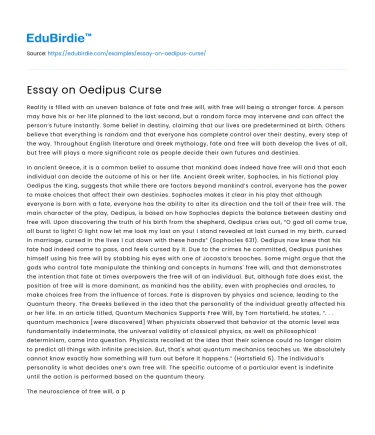Reality is filled with an uneven balance of fate and free will, with free will being a stronger force. A person may have his or her life planned to the last second, but a random force may intervene and can affect the person’s future instantly. Some belief in destiny, claiming that our lives are predetermined at birth. Others believe that everything is random and that everyone has complete control over their destiny, every step of the way. Throughout English literature and Greek mythology, fate and free will both develop the lives of all, but free will plays a more significant role as people decide their own futures and destinies.
In ancient Greece, it is a common belief to assume that mankind does indeed have free will and that each individual can decide the outcome of his or her life. Ancient Greek writer, Sophocles, in his fictional play Oedipus the King, suggests that while there are factors beyond mankind’s control, everyone has the power to make choices that affect their own destinies. Sophocles makes it clear in his play that although everyone is born with a fate, everyone has the ability to alter its direction and the toll of their free will. The main character of the play, Oedipus, is based on how Sophocles depicts the balance between destiny and free will. Upon discovering the truth of his birth from the shepherd, Oedipus cries out, “O god all come true, all burst to light! O light now let me look my last on you! I stand revealed at last cursed in my birth, cursed in marriage, cursed in the lives I cut down with these hands” (Sophocles 631). Oedipus now knew that his fate had indeed come to pass, and feels cursed by it. Due to the crimes he committed, Oedipus punishes himself using his free will by stabbing his eyes with one of Jocasta’s brooches. Some might argue that the gods who control fate manipulate the thinking and concepts in humans' free will, and that demonstrates the intention that fate at times overpowers the free will of an individual. But, although fate does exist, the position of free will is more dominant, as mankind has the ability, even with prophecies and oracles, to make choices free from the influence of forces. Fate is disproven by physics and science, leading to the Quantum theory. The Greeks believed in the idea that the personality of the individual greatly affected his or her life. In an article titled, Quantum Mechanics Supports Free Will, by Tom Hartsfield, he states, “. . . quantum mechanics [were discovered] When physicists observed that behavior at the atomic level was fundamentally indeterminate, the universal validity of classical physics, as well as philosophical determinism, came into question. Physicists recoiled at the idea that their science could no longer claim to predict all things with infinite precision. But, that's what quantum mechanics teaches us. We absolutely cannot know exactly how something will turn out before it happens.” (Hartsfield 6). The individual’s personality is what decides one’s own free will. The specific outcome of a particular event is indefinite until the action is performed based on the quantum theory.
Save your time!
We can take care of your essay
- Proper editing and formatting
- Free revision, title page, and bibliography
- Flexible prices and money-back guarantee
The neuroscience of free will, a part of neurophilosophy, is the study of the interconnections between free will and neuroscience. Science has discovered that it is not that your choices are the product of your brain, but that your brain is the product of your choices. The brain is like plastic that is constantly changing and reforming in accordance with your thoughts. An article titled Neuroplasticity Studies Reveal Your Brain’s Amazing Malleability, by Dr. Joseph Mercola, states, “As time goes by, science provides more and more evidence that your brain is malleable and continually changing in response to your lifestyle, physiology, and environment.” (Mercola 1). Dr. Mercola’s study showed that people have more control over their brains and functions than they realize; contributing to their free will. People have control over their own future with the decisions they make. Every action has a direct impact.
Fate is a concept that has been discussed throughout millennia. Supposedly, fate is what decides the outcome of every situation in life. However, humans have the free will to make decisions; they have the capacity to choose what is wrong and what is right within a given situation. Fate does exist, but the power of free will dominates our lives. This topic matters because our lives are controlled by our free will; and the decisions that we can freely make. We can alter our actions, thoughts, and beliefs into what we deem appropriate in a given situation. Therefore, the core of our abilities lies within the free will. Free will exists within the level of decisions, deliberations, and imagination. The universe is a series of random, ever-shifting events. Your decision determines your future. Every single choice you have made in your life has led you to this very moment.






 Stuck on your essay?
Stuck on your essay?

